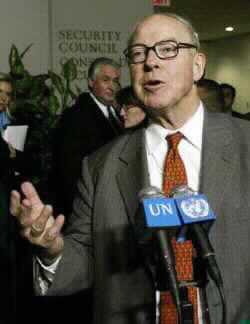- Author:
& News Agencies - Section:
WORLD HEADLINES
Chief UN arms inspector to meet with US leadership

Chief UN weapons inspector Hans Blix is to meet here with US Vice President Richard Cheney and other top officials to discuss prospects for overcoming opposition in the UN Security Council to enacting a tough new inspection regime for Iraq.President George W. Bush was also likely to participate in the Wednesday meetings, a US official said.
Blix, who heads the UN Monitoring, Verification and Inspection Commission (UNMOVIC), arrived here Tuesday in the company of the director general of the International Atomic Energy Agency (IAEA), Mohammed El-Baradei.
His UN spokesman said in New York that they had been invited by the US government and were expected to return to New York around noon Wednesday.
Blix and El-Baradei were also scheduled to hold talks with US national security adviser Condoleezza Rice and Secretary of State Colin Powell, according to the administration official, who spoke on condition of anonymity.
"The president will probably drop by," the official said, declining to give details on the agenda of the talks.
White House officials clearly took heart on Monday when Blix urged the Security Council to give full support to the weapons inspectors he intends to send to Iraq, saying it would be helpful to warn Iraq that there would be consequences if it failed to cooperate.
"It helps us if Iraq is conscious that non-cooperation will entail reactions by the council," Blix said.
The United States has been trying to persuade key members of the Security Council to agree to a strong resolution that would give arms inspectors a tough new mandate for resuming their work in Iraq, and spell out consequences if Baghdad fails to cooperate.
The Security Council met late Tuesday to discuss a 27-paragraph draft resolution presented by the United States last week. But the session was delayed by a previous meeting and was postponed until Wednesday.
The council met on Iraq twice last week and on Monday, when it heard from Blix.
The draft resolution is backed by Britain but the other three veto-carrying permanent council members -- France, Russia and China -- say it contains "hidden triggers" for the automatic use of military force against Iraq.
PHOTO CAPTION
Chief United Nations weapons inspector Hans Blix speaks to reporters after attending a Security Council meeting on Iraq at the United Nations in New York on October 28. REUTERS/Peter Morg


 Home
Home Discover Islam
Discover Islam Quran Recitations
Quran Recitations Lectures
Lectures
 Fatwa
Fatwa Articles
Articles Fiqh
Fiqh E-Books
E-Books Boys & Girls
Boys & Girls  Women
Women









